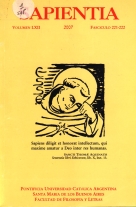Por favor, use este identificador para citar o enlazar este ítem:
https://repositorio.uca.edu.ar/handle/123456789/4490| Título: | Das paradies in der politik ein kapitel negativer kosmologie | Autor: | Schabert, Tilo | Palabras clave: | CREACION; POLITICA; CUERPO; COSMOLOGIA; RELIGION | Fecha de publicación: | 2007 | Editorial: | Universidad Católica Argentina. Facultad de Filosofía y Letras | Cita: | Schabert, T. Das paradies in der politik ein kapitel negativer kosmologie [en línea]. Sapientia. 2007, 62 (221-222). Disponible en: https://repositorio.uca.edu.ar/handle/123456789/4490 | Resumen: | Abstract: The idea of a “paradise in politics” is an answer to the cosmogonic- anthropogonic problem that, through their bodies, the life of human beings has been shaped politically from the very beginning: all creation is a creation of bodies and bodies are power. All creation, furthermore, means separation, it emerges through a multiplicity of things and beings only. The conventional solution for the problem, in the realm of human beings, consists in forming societies out of a multiplicity of indivuals that remains as such. The solution of a “paradise in politics”, however, envisions a “healing” of creation through a bodily transmutation by which a world of bodies emerges that is freed from the problem of bodies: separation, power. The article discusses the negative cosmology with which all tales on a paradise in politics start. It shows the essential role of phantasy in the constitution of these tales, and elucidates the principal structural elements through which visions of a paradise in politics are built. A special attention is given to the parallelism between these visions and known religious thought, as in the case of the concepts of apokatastasis or perichoresis, for instance. Methodically, the article achieves a demonstration of its subject by an extensive presentation and analysis of two case studies: Rousseau’s vision of a “terrestrial paradise” and the attempt at “bodily redemption” put on the stage in 1968-69 by the “Living Theatre” Group with its performance “Paradise Now”. Zusammenfassung: Die Idee eines “Paradieses in der Politik” stellt eine Antwort auf das kosmogonisch-anthropogonische Problem dar, daß das Leben der Menschen durch ihre Körper von allem Anfang an politisch ist: alle Schöpfung ist eine Schöpfung in Körpern, und Körper sind Macht. Schöpfung heißt überdies Trennung, sie geht zu Vielem, in eine Vielzahl von Dingen und Lebewesen auseinander. Die konventionelle Lösung für das beschriebene Problem besteht im menschlichen Bereich darin, aus und mit der Vielzahl von Individuen Gesellschaften zu bilden, in denen diese Vielzahl bleibt. Mit der Lösung eines “Paradieses in der Politik” wird dagegen eine “Heilung” der Schöpfung vorgestellt, mittels einer Transmutation der Körper, durch welche eine Welt von Körper entsteht, die vom Problem der Körper - Trennung, Macht - befreit ist. Der Artikel erörert die negative Kosmologie, mit der alle Erzählungen von einem Paradies in der Politik beginnen. Er zeigt die wesentliche Rolle der Phanasie auf, und erhellt die wichtigsten strukturellen Elemente in allen Konstruktionen eines Paradieses in der Politik. Besonders hervorgehoben werden die Parallelen zwischen diesen Konstruktionen und bekannten Kategorien des theologisch-religiösen Denkens, wie zum Beispiel die apokatastasis oder die perichoresis. Methodisch gesehen wird das Thema des Artikels anhand von zwei ausführlichen Fallstudien ausgeführt: Rousseau`s Vision eines “irdischen Paradieses”. sowie das Projekt einer “Erlösung der Körper” im Medium des Theaters, wie es 1968-69 die “Living Theatre” Grupe mit der Stück “Paradise Now” vorzeigte. |
URI: | https://repositorio.uca.edu.ar/handle/123456789/4490 | ISSN: | 0036-4703 | Disciplina: | FILOSOFIA | Derechos: | Acceso Abierto | Fuente: | Versión original impresa en Sistema de Bibliotecas UCA: Sapientia Vol. LXII, Nº 221-222, 2007. |
| Aparece en las colecciones: | SAP - 2007 Vol LXII nro. 221-222 |
Ficheros en este ítem:
| Fichero | Descripción | Tamaño | Formato | |
|---|---|---|---|---|
| das-paradies-in-der-politik.pdf | 352,25 kB | Adobe PDF |  Visualizar/Abrir |
Visualizaciones de página(s)
97
comprobado en 30-abr-2024
Descarga(s)
90
comprobado en 30-abr-2024
Google ScholarTM
Ver en Google Scholar
Este ítem está sujeto a una Licencia Creative Commons

